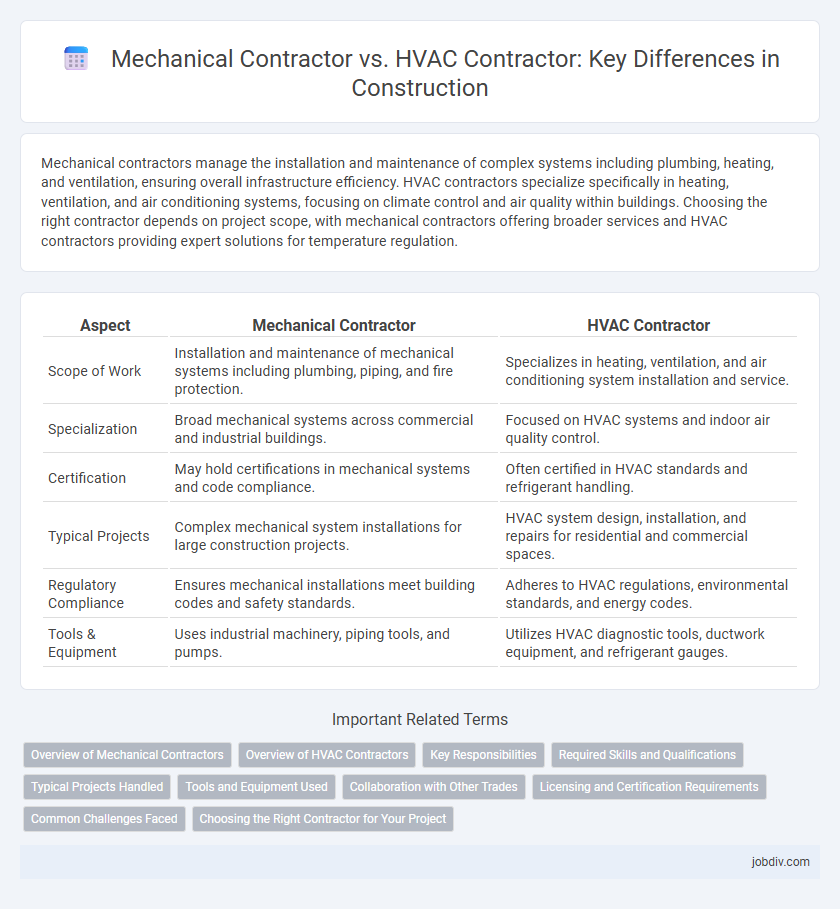Mechanical contractors manage the installation and maintenance of complex systems including plumbing, heating, and ventilation, ensuring overall infrastructure efficiency. HVAC contractors specialize specifically in heating, ventilation, and air conditioning systems, focusing on climate control and air quality within buildings. Choosing the right contractor depends on project scope, with mechanical contractors offering broader services and HVAC contractors providing expert solutions for temperature regulation.
Table of Comparison
| Aspect | Mechanical Contractor | HVAC Contractor |
|---|---|---|
| Scope of Work | Installation and maintenance of mechanical systems including plumbing, piping, and fire protection. | Specializes in heating, ventilation, and air conditioning system installation and service. |
| Specialization | Broad mechanical systems across commercial and industrial buildings. | Focused on HVAC systems and indoor air quality control. |
| Certification | May hold certifications in mechanical systems and code compliance. | Often certified in HVAC standards and refrigerant handling. |
| Typical Projects | Complex mechanical system installations for large construction projects. | HVAC system design, installation, and repairs for residential and commercial spaces. |
| Regulatory Compliance | Ensures mechanical installations meet building codes and safety standards. | Adheres to HVAC regulations, environmental standards, and energy codes. |
| Tools & Equipment | Uses industrial machinery, piping tools, and pumps. | Utilizes HVAC diagnostic tools, ductwork equipment, and refrigerant gauges. |
Overview of Mechanical Contractors
Mechanical contractors specialize in the installation, maintenance, and repair of mechanical systems such as plumbing, heating, ventilation, and air conditioning (HVAC) within commercial and industrial buildings. Their expertise extends beyond HVAC to include steam piping, refrigeration, and fire suppression systems, offering comprehensive mechanical solutions. Mechanical contractors coordinate closely with architects and engineers to ensure system integration and compliance with building codes and safety standards.
Overview of HVAC Contractors
HVAC contractors specialize in the installation, maintenance, and repair of heating, ventilation, and air conditioning systems, ensuring indoor air quality and thermal comfort in residential and commercial buildings. They possess expertise in ductwork design, refrigerant handling, and system energy efficiency compliance with regulations such as ASHRAE standards. Unlike mechanical contractors who cover a broader scope including plumbing and fire protection, HVAC contractors focus specifically on climate control technologies and equipment.
Key Responsibilities
Mechanical contractors oversee the installation, maintenance, and repair of mechanical systems including plumbing, fire protection, and HVAC equipment across construction projects. HVAC contractors specialize specifically in heating, ventilation, and air conditioning systems, focusing on ductwork, climate control equipment, and air quality solutions. Both roles require expertise in system design, adherence to safety codes, and coordination with project stakeholders to ensure operational efficiency and regulatory compliance.
Required Skills and Qualifications
Mechanical contractors require expertise in installing, maintaining, and repairing mechanical systems such as plumbing, heating, and ventilation, often holding certifications in mechanical engineering or related trades. HVAC contractors specialize in heating, ventilation, and air conditioning systems, demanding knowledge in refrigerant handling, system design, and energy efficiency standards, typically requiring EPA certification and HVAC technician licenses. Both roles necessitate strong problem-solving skills, familiarity with building codes, and experience in blueprint reading to ensure compliance and operational safety.
Typical Projects Handled
Mechanical contractors typically handle large-scale industrial and commercial projects involving complex systems such as plumbing, fire protection, and process piping installations. HVAC contractors focus on heating, ventilation, and air conditioning systems for residential, commercial, and institutional buildings, ensuring climate control and indoor air quality. Both play crucial roles in construction, but mechanical contractors often manage broader mechanical systems beyond HVAC installations.
Tools and Equipment Used
Mechanical contractors utilize a broad range of heavy-duty tools and equipment such as pipe threading machines, welding tools, and industrial compressors to install and maintain complex mechanical systems. HVAC contractors specialize in equipment like refrigerant recovery machines, vacuum pumps, manifold gauge sets, and air duct fabrication tools tailored specifically for heating, ventilation, and air conditioning system installation and repair. Both rely on advanced diagnostic devices, but HVAC contractors focus more on tools that ensure precise temperature control and air quality management.
Collaboration with Other Trades
Mechanical contractors coordinate closely with electrical, plumbing, and structural trades to ensure seamless integration of systems like heating, ventilation, air conditioning, and fire protection. HVAC contractors collaborate with architects, engineers, and general contractors to design and install efficient climate control systems that meet building codes and energy standards. Effective communication and scheduling between mechanical and HVAC contractors minimize project delays and enhance overall construction workflow.
Licensing and Certification Requirements
Mechanical contractors must obtain state-specific licenses that often cover a broad range of systems, including plumbing, refrigeration, and HVAC installations, ensuring compliance with general mechanical codes. HVAC contractors require specialized certifications such as EPA Section 608 for refrigerant handling and may need additional local licenses focusing solely on heating, ventilation, and air conditioning systems. Both contractors must adhere to rigorous insurance and bonding requirements, but licensing scope differentiates their capacities and regulatory obligations in construction projects.
Common Challenges Faced
Mechanical contractors often encounter challenges related to coordinating complex systems integration, managing stringent building codes, and ensuring timely delivery of materials. HVAC contractors frequently face difficulties in balancing energy efficiency standards with client comfort requirements, navigating frequent equipment upgrades, and maintaining system reliability under variable load conditions. Both roles require meticulous project management and adaptive problem-solving to address unforeseen site conditions and regulatory compliance issues.
Choosing the Right Contractor for Your Project
Selecting the right contractor is crucial for project success, with mechanical contractors specializing in comprehensive systems including plumbing, piping, and HVAC, while HVAC contractors focus specifically on heating, ventilation, and air conditioning installations and maintenance. Mechanical contractors offer broader expertise for complex projects requiring integrated mechanical solutions, whereas HVAC contractors provide specialized knowledge for climate control systems. Evaluating project scope, budget, and technical requirements ensures a well-informed decision tailored to your construction needs.
Mechanical Contractor vs HVAC Contractor Infographic

 jobdiv.com
jobdiv.com